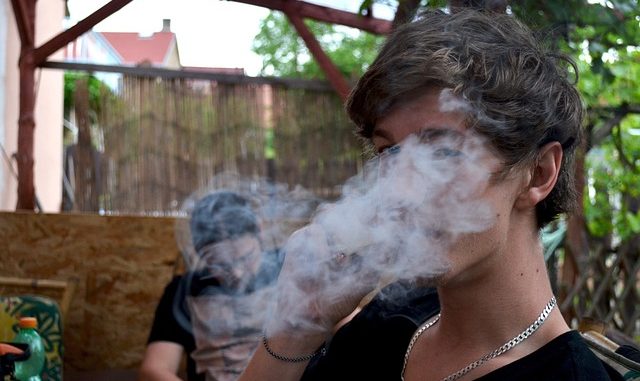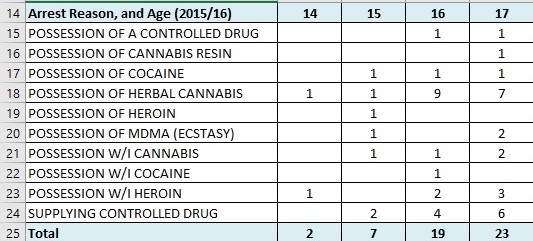
Thirty-one youngsters under the age of 18 were arrested for drug offences in Thanet in the last financial year (April 2016-March 2017).
Data supplied by Kent Police under the Freedom of Information act shows twenty-two offences were for drug supply, including dealing Class A drugs.
Offenders were aged between 14 and 17 at the time of arrest.
One 14-year-old was arrested for possession and intent to supply heroin and two were arrested for supplying a controlled drug.

Data showing the result of those arrests reveals nine youths were released without charge, three received cautions, four were released on bail while investigations were carried out and seven were bailed to appear at court.
Four were ordered to report by summons and another four were ordered to take part in a drug intervention programme.
Of those going through the court system three were convicted, one was found not guilty, one case is ongoing and two are recorded as outcome unknown.
2015/16
The arrest figure is lower than the same time period for 2015/16 where there were 47 arrests of 14-17 year olds for a total of 51 drug offences, with 23 of those relating to drug supply charges including one 14-year-old arrested for intent to supply heroin.
The 2015/16 figures also show three arrests for possessing MDMA compared to none for 2016/17.

The results for the 2015/16 arrests were 18 bailed to appear at court, two charged and remanded, one where detention was refused and six were ordered to take part in a drug intervention programme.
Another 18 were released without charge, with one youth taking part in restorative justice, one ordered to report to summons and four given a caution.
Out of those going to court 15 were convicted, two were found not guilty, one case is ongoing and two are recorded as outcome unknown.
Dealing with youth drug issues
According to Public Health England very few young people develop dependency. Those who use drugs or alcohol problematically are likely to be vulnerable and experiencing a range of problems, of which substance misuse is one.
Young people and their needs differ from adults:
- The majority of young people accessing specialist drug and alcohol interventions have problems with alcohol (37%) and cannabis (53%), requiring psychosocial, harm reduction and family interventions, rather than treatment for addiction, which most adults but only a small minority of young people require.
- Most young people need to engage with specialist drug and alcohol interventions for a short period of time, often weeks, before continuing with further support elsewhere, within an integrated young people’s care plan.
Drug offence reports (all ages) April 2016-March 2017 by ward
In the year April 2016 to March 2017 the ward with the highest number of reported drug offences was Cliftonville West while the lowest report, of zero, was in Kingsgate.
Beacon (Broadstairs) 1
Birchington north 2
Birchington south 6
Bradstowe (Broadstairs) 5
Central Harbour (Ramsgate) 14
Cliffsend and Pegwell 5
Cliftonville East 11
Cliftonville West 40
Dane Valley (Margate) 9
Eastcliff (Ramsgate) 29
Garlinge 10
Kingsgate 0
Margate Central 97
Nethercourt (Ramsgate) 6
Newington (Ramsgate) 11
Northwood (Ramsgate) 14
Salmestone (Margate) 12
Sir Moses Montefiore (Ramsgate/Broadstairs) 3
St Peters 8
Thanet villages 6
Viking (Broadstairs) 3
Westbrook 6
Westgate 9
Drug classifications
Class A:
These include: cocaine and crack, ecstasy, heroin, LSD, methadone, methamphetamine (crystal meth), fresh and prepared magic mushrooms.
Class B:
These include: amphetamine (not methamphetamine), barbiturates, codeine, ketamine, synthetic cannabinoids such as Spice and cannabis. All cathinone derivatives, including mephedrone, methylone, methedrone and MDPV were brought under control as Class B substances in 2010.
Class C:
These include: anabolic steroids, minor tranquillisers or benzodiazepines, GBL and GHB, khat and BZP.
Maximum penalties
| Drug class | Possession | Supply |
| Class A | 7 years + fine | Life + fine |
| Class B | 5 years + fine | 14 years + fine |
| Class C | 2 years + fine | 14 years + fine |
Less serious offences are usually dealt with by magistrates’ courts, where sentences can’t exceed six months and/or a £5,000 fine, or three months and/or a fine.
Most drug offenders are convicted of unlawful possession. Although maximum penalties are severe, only around one in five people convicted of possession receive a custodial sentence and even fewer actually go to prison, with the majority of fines £50 or less.
Get help/advice
http://www.talktofrank.com/treatment-drug-problems-explained

